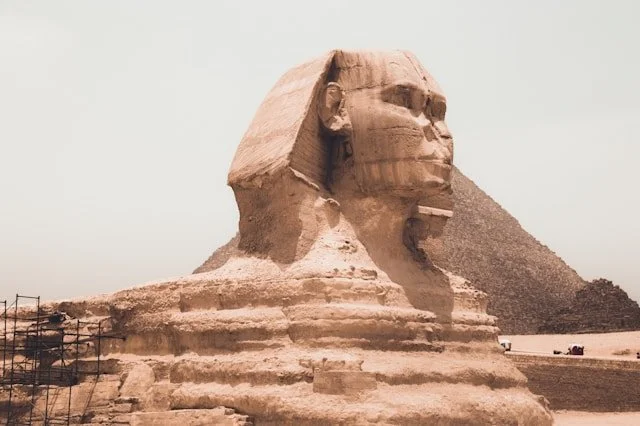Where would the bread come from?
Jacob heard his grandchildren’s whimpers as they rustled in the neighboring tents. He knew tears were running down their faces as their tiny empty bellies cried out.
Where would the next meal come from? The drought had devastated the crop.
Travelers from the North had spent the night. They carried bags of grain and shared news that the Pharaoh had storehouses of grain. They had met with his right-hand man, Zaphenath-paneah.
Seven years earlier, the Pharaoh was troubled. He couldn’t shake the nightmares. Skinny cows devouring fat cows, thin stalks of grain consuming fat stalks. His wise men couldn’t interpret his dreams, and his magicians couldn’t interpret his dreams.
He heard rumors of a Hebrew prisoner who could interpret dreams. This young man, called Joseph, told him his god could interpret his dream. And so he did. Joseph told him that there would be seven years of plenty followed by seven years of famine. Somehow, Pharaoh knew this was the truth, that he was hearing the voice of the Divine. He trusted and responded.
Pharaoh renamed Joseph with an Egyptian name: Zaphenath-paneah, “the god speaks and he lives,” and appointed him over all his wise men.
And it came to pass just as Joseph had predicted. And God blessed Egypt.
And God saved Jacob and his family.
Generations pass, fearing the growing power of a multiplying group of people, and seeing an opportunity to harness the power of this indebted people-group, the Pharaoh enslaved the people. How did it happen? We don’t know. Perhaps it came in one fell swoop, a decree that transformed a free people into an enslaved people. Maybe it came over time: rights stripped one by one, with onerous taxation leading to the enslavement of Israel.
Yesterday’s promised land became today’s curse for Israel. A place of rescue became a place of slavery. The land of bread became the land of bricks.
Israel cried out. And the Lord heard their cry.
Hundreds of years pass. Another Hebrew strides into the presence of the Pharaoh. “The LORD, the God of the Hebrews, sent me to you, saying, ‘Let my people go, that they may serve me in the wilderness’” (Ex. 7:16). And the Pharaoh hardened his heart. Where his predecessor in generations past heard Joseph’s warning and received it as the voice of God, Pharaoh rejected it as the voice of God.
Pharaoh witnesses the Lord’s power come in wave upon wave, plague upon plague. Seven plagues ravaged the land. The Nile turned to blood. Frogs, lice, and flies infested the homes. Livestock was struck dead, boils covered the people, and then hail destroyed the flax and barley crops, which were primarily used to make clothes and for alcoholic beverages. Life was terrible. The people couldn’t remember the last time they had a decent night’s sleep. And yet, as awful as things were, God hadn’t touched the Egyptians’ food source (wheat).
Moses and Aaron re-enter the Pharaoh’s throne room and speak again,
“Thus says the Lord, the God of the Hebrews, ‘How long will you refuse to humble yourself before me? Let my people go, that they may serve me. For if you refuse to let my people go, behold, tomorrow I will bring locusts into your country, and they shall cover the face of the land, so that no one can see the land. And they shall eat what is left to you after the hail, and they shall eat every tree of yours that grows in the field, and they shall fill your houses and the houses of all your servants and of all the Egyptians, as neither your fathers nor your grandfathers have seen, from the day they came on earth to this day.’” Then he turned and went out from Pharaoh.
Then Pharaoh’s servants said to him, “How long shall this man be a snare to us? Let the men go, that they may serve the Lord their God. Do you not yet understand that Egypt is ruined?” (Ex. 10:3-7).
But the Pharaoh wouldn’t relent. And so the locusts came, and the wheat crop was destroyed.
Days and then weeks passed. Where would the bread come from?
The Pharaoh heard the whimpers from his grandchildren as they rustled in the neighboring rooms. He knew tears were running down their faces as their tiny empty bellies cried out.
God removed Egypt’s blessing. Yesterday’s promise was today’s curse.
The Pharaoh refused to believe that the bounty Egypt had been blessed with could be taken away. It was his. He deserved it. He was owed the blessing.
When we presume upon God’s grace, we are in danger. When we think that the blessings God has extended to us are our birthright, then we ought to tremble.
Yesterday’s promise might be today’s curse. Repent. Offer gratitude to your Creator. And release your demands.
You may also appreciate:
Photo by Adrian Dascal on Unsplash
